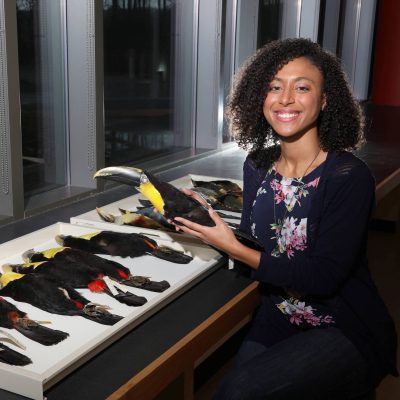Student Spotlight: Amelia-Juliette Demery

March 8, 2021
Amelia-Juliette Demery is a doctoral candidate in ecology and evolutionary biology from La Crescenta, California. After attending California State Polytechnic University, Pomona, she chose to pursue further study at Cornell for her advisor, research opportunities, and the chance to spend several years in upstate New York.
What is your area of research and why is it important?
I am fascinated by the origins of color and how/why it varies across space and time. I am interested in how gene expression predicts color variation in bare-part avian traits like beaks and eyes, traits that appear so unchanging but are actually some of the most variable traits a bird can have. Usually discovering the factors involved in any color trait means appreciating the full network of pathways and factors that impact and drive variation, which is what I hope to emphasize in my work and inspire in future projects.
What are the larger implications of this research?
I hope that my research will bring insights into the comprehensive underpinnings of color expression, that the origin of color at the genetic level goes through an adventure of factors and pathways to even make it to the end point. And, through those insights, I hope that we will have a better understanding of what it means to have color and how it can evolve given its nuance and complexity.
You co-authored a paper in Nature about safer fieldwork. Tell us about it.
My paper, co-authored with Monique Pipkin, defines what it means to be at-risk while conducting fieldwork in STEM and designs proactive strategies implemented with systematic intention for the benefit of researchers, supervisors, and institutions. The goal was to provide a paper that anyone and everyone can read and think to themselves, “This speaks to me. I feel like this paper was written for me and my well-being.” And that the reader comes from every background and power dynamic in STEM.
What gave you the idea to write the paper and set up the accompanying workshop?
Monique reached out to me to discuss what we both do to keep ourselves safe in the field. We talked about discussions we have had with our advisors and the need to write a field safety guide for our department. When we solicited feedback, the demand for a paper motivated us to write for anyone in STEM, not just our local peers. I serve on the CALS Committee for Diversity and Inclusion and was contacted by my colleagues, Dr. Chelsea Specht and Sara X. Hernández, who saw opportunity to leverage the paper’s versatility into a seminar and applied framework.
What are your hobbies or interests outside of your research or scholarship?
I love love to play Dungeons and Dragons (also play with Monique!), play soccer, kick box, knit, and read. I also treat my two aquariums like cats, which is to say that I adore them with all my heart.
Why did you choose Cornell to pursue your degree?
There were three main things. First, I really respected the vibe I got from my advisor – I felt like I was seen as a professional and as a person, and for a commitment like a Ph.D. that speaks volumes. I loved the opportunities for my research – it is risky and I can definitely say that I am thriving in the atmosphere of rigorous research and creativity. Lastly, but this was the deciding vote I kid you not, I cannot resist adventure, so as a Southern Californian the idea of spending six years in upstate New York and surviving the winters was too much of a thrill to pass up. And I’m loving it!
